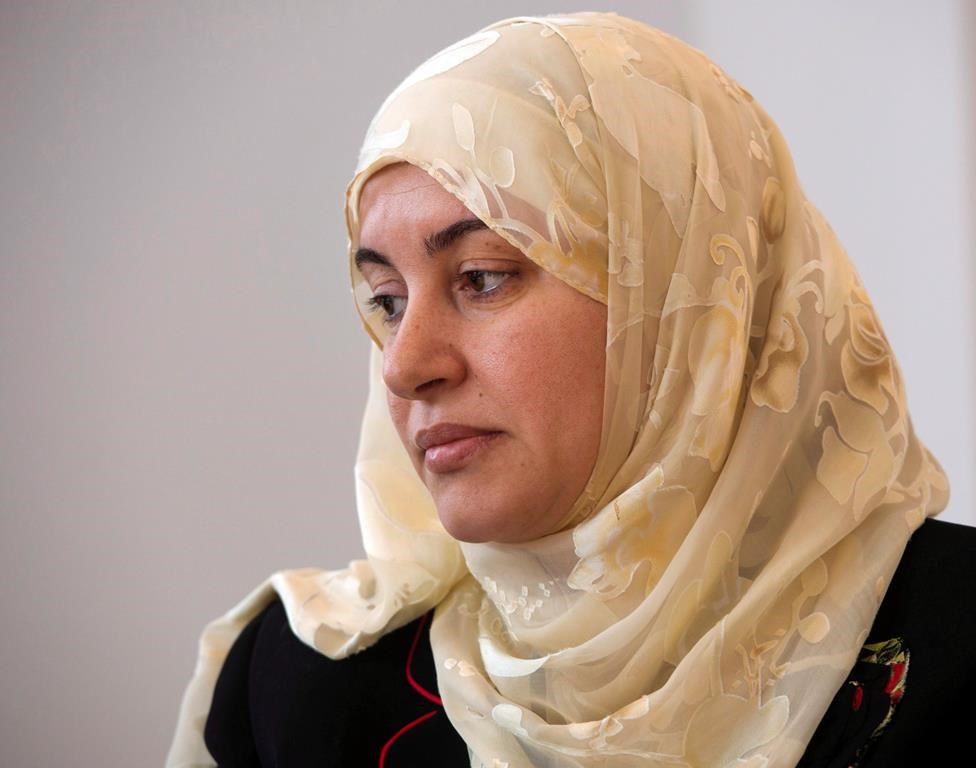The disciplinary case against a Quebec judge who refused to allow a Muslim woman to appear before her wearing a hijab more than four years ago was put on hold again Friday.

Quebec court Judge Eliana Marengo took exception to a brief filed Monday by a lawyer for Quebec’s judicial council that said her alleged misconduct was serious enough to warrant her removal from the bench.
A lawyer for Marengo argued unsuccessfully that the council lawyer and the panel convened to hear her case should recuse themselves because the document had tainted the process against her.
Lawyer Raymond Doray argued Friday that the document revealed a lack of impartiality and objectivity, but the panel rejected those arguments and refused to step aside.
READ MORE: Supreme Court of Canada won’t hear appeal from Quebec judge over hijab disciplinary probe
Before the case against the judge could begin, Marengo requested a judicial review of the decision — putting the matter on hold. The judge has already sought unsuccessfully to have the Supreme Court of Canada end the disciplinary case.
Doray informed the panel he would seek a quick date before Quebec Superior Court. The matter was adjourned until June 21, and it could be delayed a few months. In the meantime Marengo continues to preside over cases.
Rania El-Alloul, the woman who in February 2015 was told by Marengo to remove her hijab if she wanted her case to proceed, attended Friday’s hearing, as did the judge.

Get breaking National news
In February 2015, Marengo told El-Alloul the courtroom was a secular space and she was violating rules requiring suitable dress.
READ MORE: Quebec high court rules judge wrong to order woman to remove hijab
“In my opinion, you are not suitably dressed,” Marengo told El-Alloul. “Decorum is important. Hats and sunglasses, for example, are not allowed. And I don’t see why scarves on the head would be either.”
“I will therefore not hear you if you are wearing a scarf on your head, just as I would not allow a person to appear before me wearing a hat or sunglasses on his or her head, or any other garment not suitable for a court proceeding.”
Lawyer Pierre Laurin’s 22-page brief, filed Monday with the panel but not made public, was criticized heavily by Doray on Friday. The document suggested Marengo had committed six ethical breaches, but Doray said the brief was lacking and misleading and had tainted the five-member committee.
The judge’s 2015 comments triggered numerous complaints to the Conseil de la magistrature, the judicial council which hears complaints against Quebec-appointed judges.
It decided some were founded and formed a committee to investigate Marengo’s conduct in June 2016.
Marengo asked Quebec Superior Court to force the judicial council to end its investigation, arguing it had breached the principle of judicial independence. She lost in February 2017.
In February 2018, the Court of Appeal also found against her, ruling that “the continuation of the inquiry by the committee, while a delicate exercise in the circumstances, is the only possible avenue for an enlightened justice.” Marengo exhausted her final appeal last December, when the Supreme Court of Canada refused to hear her case.
Last October, the Court of Appeal ruled in a separate case that obliging El-Alloul to remove her Muslim head scarf was a violation of her fundamental rights. It said in a unanimous decision that citizens who wear religious attire cannot be denied access to justice and that freedom of religious expression doesn’t stop at the courtroom door.
WATCH BELOW: Judge erred in ordering woman remove hijab: Quebec highest court

“No party challenges that the courtrooms of the court of Quebec — and for that matter all courtrooms in Quebec as throughout Canada — are spaces of religious neutrality,” the three-judge appeal panel found. “This does not mean, however, that judges may rely on the neutrality of the courts alone as a justification for preventing litigants from accessing a courtroom simply because they are expressing sincerely held religious beliefs.”
Khalid Elgazzar, a lawyer for the National Council of Canadian Muslims which has accompanied El-Alloul in recent years, was alongside her again after the panel asked her to come and testify.
El-Alloul didn’t speak to reporters, but Elgazzar said she is ready to co-operate when the hearing resumes.
“At the end of the day, these are things that are out of her control,” Elgazzar said. “She respects the legal proceedings, respects the process and she’s obviously looking forward to some kind of closure here.”







Comments